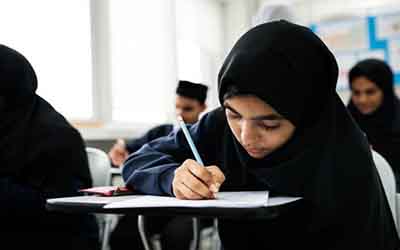Education is a powerful tool that can break the cycle of poverty and create a brighter future.
In Pakistan, where millions of children have lost one or both parents, access to education can be especially challenging.
However, several scholarship programs aim to support orphaned students in their academic pursuits.
This guide will explore the different scholarship opportunities available for orphans in Pakistan, providing a roadmap for them to achieve their educational goals.
Types of Scholarships for Orphans in Pakistan
See below;
1. Government Scholarships
The Pakistani government recognizes the importance of education for orphans and offers scholarships to ease their financial burden.
These scholarships primarily target undergraduate degrees (Bachelors) in government colleges and universities.
The scope of financial assistance can vary, with some programs covering full tuition fees while others might offer partial coverage.
Here’s what to keep in mind about government scholarships:
- Eligibility Criteria: Look for details on government websites outlining the specific requirements for orphan students. These may include documentation proving orphan status, academic achievement benchmarks, and income thresholds.
- Application Process: Each program will have a designated application window. Meticulously follow the application procedures, ensuring all necessary documents are submitted within the deadline.
- Benefits: Government scholarships can significantly reduce the financial burden of higher education. Depending on the program, benefits might range from full or partial tuition coverage to stipends for books and other educational materials
2. NGO Scholarships
Pakistan’s NGO sector plays a vital role in supporting orphans’ education.
These organizations offer scholarships catering to various academic levels, from primary school to university degrees. Some NGOs might cater to specific needs, such as scholarships focused on:
- Girls’ Education: Promoting female empowerment through access to education.
- Orphans in Rural Areas: Bridging the gap in educational opportunities for orphans residing in remote locations
Exploring Examples of NGO Scholarships:
- Helping Hand for Relief and Development (HHRD): This NGO offers scholarships to deserving students, including orphans, pursuing higher education in their institute – Helping Hand Institute of Rehabilitation Sciences [HRRD website].
- Tameer-i-Wattan (TWPSC):With a focus on girls’ education, TWPSC’s Orphan Scholarship Program empowers young women by providing financial aid for their academic journey [Tameer-i-Wattan website].
3. Private Scholarships:
Certain private schools and colleges establish scholarship programs specifically for orphans enrolled in their institutions.
These scholarships can vary depending on the institution’s resources and policies.
It’s crucial to research individual schools and colleges to discover any scholarship opportunities they might offer.
4. Full and Partial Scholarships
The financial aid provided by scholarships can range from comprehensive to partial coverage:
- Full Scholarships: These scholarships cover the entirety of tuition fees, and in some cases, may extend to include hostel accommodation, books, and even a living stipend.
- Partial Scholarships: As the name suggests, these scholarships provide a portion of the tuition fees, offering significant financial relief but still requiring students or their guardians to manage the remaining costs.
5. Merit-based and Need-based Scholarships
The selection criteria for scholarships can differ. Here are the two main categories:
- Merit-based Scholarships: These scholarships prioritize academic excellence, requiring strong grades and entrance exam scores.
- Need-based Scholarships: These scholarships focus on supporting orphans from underprivileged backgrounds. Financial hardship and orphan status are primary considerations for selection.
Who is Eligible for Scholarships for Orphans in Pakistan?
Scholarship programs in Pakistan for orphans aim to empower them through education.
However, each program has specific eligibility requirements. Here’s a breakdown of the common factors considered:
1. Orphan Status Verification
- Proof of orphan status is a standard requirement. This might involve submitting a death certificate of one or both parents, depending on the program
- Some scholarships have additional requirements like documentation from local authorities verifying orphan status.
2. Academic Achievement
- Merit-based Scholarships: These scholarships prioritize academic excellence. You’ll need to demonstrate strong grades in previous academic years and potentially achieve qualifying scores in entrance exams.
- Need-based Scholarships: While academic performance might be considered, financial hardship and confirmed orphan status are the primary factors for selection.
3. Educational Level
- Scholarship programs might target specific educational levels, ranging from primary school to university degrees. Ensure your academic goals align with the scholarship’s focus.
4. Location and Background
- Some scholarships cater to orphans residing in specific regions of Pakistan, aiming to bridge educational gaps in rural areas.
- Others might focus on orphans from underprivileged backgrounds.
List of 3 Scholarship Programs for Orphans in Pakistan
- Helping Hand for Relief and Development (HHRD) – Education Support Program
- Tameer-i-Wattan (TWPSC) – Orphan Scholarship Program
- Aga Khan Foundation Scholarship
1. Helping Hand for Relief and Development (HHRD) – Education Support Program
HHRD Education Support Program empowers orphans and underprivileged students to pursue their educational aspirations without financial limitations.
This program is a shining example of how organizations can make a significant impact on the lives of deserving students.
The Helping Hand for Relief and Development (HHRD) recognizes the importance of education, particularly for underprivileged children and youth.
To address this need, they established the Education Support Program (ESP). This program specifically focuses on promoting and expanding access to quality education, including higher education opportunities, through scholarships.
The target beneficiaries of the ESP are orphans, refugees, and deserving children from various countries around the world.
Some of the included countries are Jordan, Lebanon, Pakistan, and India. HHRD views education as a lifeline for these children.
It protects them from exploitation and empowers them with the knowledge and skills they need to build a brighter future. Education also strengthens the communities these children belong to by fostering resilience.

2. Tameer-i-Wattan (TWPSC) – Orphan Scholarship Program
The Tameer-i-Wattan Orphan Scholarship Program plays a crucial role in bridging the gap in educational opportunities for girls who have lost one or both parents.
By offering financial assistance, TWPSC empowers these young women to overcome financial hurdles and pursue their academic goals.
This program paves the way for a brighter future for these girls, allowing them to reach their full potential and contribute meaningfully to society.
The Tameer-i-Wattan scholarship program prioritizes deserving girls who qualify based on their orphan status.
This program recognizes the unique challenges faced by orphans, particularly girls, who might struggle to access education due to financial constraints.
While specific details might be available only on the TWPSC website, the program offers financial aid to cover educational expenses.
This can significantly reduce the financial burden on orphans and their families, allowing them to prioritize their education.
The financial aid provided by TWPSC can potentially cover various costs associated with education, such as tuition fees, books, and other essential school supplies.
3. Aga Khan Foundation Scholarship
The Aga Khan Foundation Scholarship is a prestigious international scholarship program that provides funding for postgraduate studies to outstanding students from select developing countries, including Pakistan.
The scholarship covers tuition fees, a living stipend, and travel expenses, and it is open to students from any field of study.
Applicants must demonstrate financial need, academic excellence, and strong leadership potential. The application process is rigorous, and includes an interview and a written test.
The Aga Khan Foundation Scholarship provides a number of benefits to successful applicants.
Firstly, it covers the full cost of tuition fees, as well as the cost of books and other necessary study materials.
Secondly, it provides a living stipend that covers room, board, and other basic living expenses.
Thirdly, it provides travel expenses for the student to attend their university or college.
Fourthly, it provides health insurance coverage for the student during their studies. And finally, it provides access to a global network of alumni and contacts.
How to Apply for Scholarships for Orphans in Pakistan
Here is the easy approach to take when searching for scholarship.
1. Research and Identify Opportunities:
- Government Websites: Numerous scholarships are offered by the Pakistani government. Visit the websites of relevant ministries like education or social welfare to discover available programs.
- NGO Websites: Many NGOs in Pakistan support orphans’ education. Research their websites for scholarship opportunities they might offer.
- Private Institutions: Check the websites of schools and colleges you’re interested in attending. They might offer scholarships specifically for orphans enrolled in their programs.
2. Eligibility Check:
- Meticulously examine each program’s website or application materials. Look for a clearly outlined “Eligibility Criteria” section that details all the requirements.
- Ensure your academic background, orphan status, and other relevant details align with the program’s requirements.
- When unsure about any aspect, don’t hesitate to contact the scholarship provider directly for clarification.
3. Gather Required Documents:
- Proof of Orphan Status: This is a standard requirement. You might need a death certificate of one or both parents, depending on the program. Some scholarships might require additional documentation from local authorities verifying orphan status.
- Academic Transcripts: Official transcripts from your previous educational institutions are usually required.
- Entrance Exam Results (if applicable): Some scholarships, especially merit-based ones, might require scores from standardized entrance exams.
- Recommendation Letters: Strong recommendation letters from teachers or principals can bolster your application.
- Financial Documents (if applicable): Need-based scholarships might require documentation proving financial hardship.
4. Complete the Application Form:
- Pay close attention to deadlines. Missing deadlines will automatically disqualify your application.
- Fill out the application form accurately and completely.
- Proofread your application thoroughly before submitting it. Typos or factual errors can create a negative impression.
5. Submit Your Application:
- Double-check that you’ve included all required documents.
- Submit your application following the designated method outlined by the scholarship provider (online portal, mail, etc.).
Conclusion
Scholarships provide a crucial pathway to higher education for orphans in Pakistan.
Through research and hard work, these students can access the support they need to achieve their educational goals.
By providing equal opportunities for all, scholarship programs help level the playing field and give orphans a chance to succeed.
Recommendations
6 Best Pilot Training Scholarships For Developing Countries
Top Nature Conservancy Scholarships
Scholarships for students with eczema

